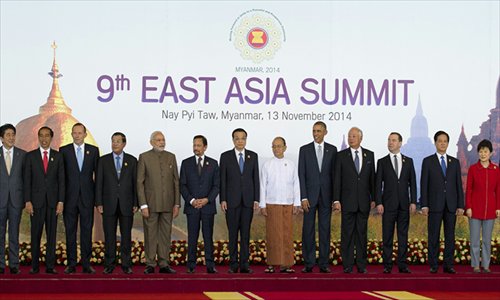Li vows S.China Sea stability
Premier reiterates dual-track approach to territorial spats

Leaders attending the 9th East Asia Summit pose for a group photo before a meeting in Myanmar's capital Nay Pyi Taw on Thursday. Photo: AFP
Chinese Premier Li Keqiang on Thursday reiterated a dual-track approach to solving South China Sea disputes, signaling China's insistence on one-on-one discussion between the nations directly involved, while providing assurances of regional stability.
Speaking on Thursday in Nay Pyi Taw, Myanmar, during the East Asia Summit, Li said the situation in the South China Sea is on the whole stable, and restated China's desire to settle territorial disputes using a dual-track approach wherein disputes are to be solved through negotiations between the countries directly concerned, while the region's peace and stability are upheld through cooperation between China and the Association of Southeast Asian Nations (ASEAN).
"China and ASEAN agreed to actively carry out consultation to reach, on the basis of consensus and at an early date, a code of conduct in the South China Sea," Li said, reported the Xinhua News Agency.
The premier stressed that, "The two wheels of the political and security fields, and the economic field should move forward at the same time."
The long-running string of overlapping claims in the potentially oil-rich South China Sea had been expected to be a major part of the agenda during the ASEAN summit and the East Asia Summit on Wednesday and Thursday with potential impact on regional stability.
In what some analysts described as an attempt to dispel fears caused by the so-called "China threat," the premier proposed a Sino-ASEAN treaty on good-neighborliness, friendship and cooperation, and also said China is willing to sign legal documents with more countries in the region on the same themes.
Li's remarks come as the territorial disputes, chiefly with the Philippines and Vietnam, continue to simmer following a row over a Chinese oil rig deployed in waters near the Xisha Islands and the Philippines' push for international arbitration in the South China Sea dispute.
The Philippines' GMA News TV recently reported that Manila will not withdraw its arbitration document - filed before an international court of arbitration - seeking to invalidate China's claims over the South China Sea, which overlap with Philippine claims.
China signed a joint declaration with ASEAN in 2002 that set out broad principles on conflict resolution in the South China Sea, which stipulates that signatories should "exercise self-restraint in the conduct of activities that would complicate or escalate disputes." Talks to upgrade the declaration to a code of conduct have stalled since.
"China has shown its sincerity in these issues, and has promised not to settle them with military force. It has also made clear that it rejects any third-party involvement in the discussion as it may further aggravate the situation," Lu Jianren, a senior research fellow at the China-ASEAN Research Institute of Guangxi University, told the Global Times.
ASEAN, as a group, has been prudent on the issue and resisted measures that would increase tensions.
Lu, however, expressed doubts about the sincerity of the Philippines and Vietnam with respect to the impasses, following Vietnam's recent expansion of cooperation with India in oil and gas exploration in contested waters, while Manila has been reluctant to participate in negotiations.
Wu Shicun, director of the Haikou-based National Institute for South China Sea Studies, pointed out that the US has influenced the issue through its rebalancing strategy.
"The South China Sea dispute has been one of the key issues the US uses to contain China as a major part of its rebalancing strategy," Wu said.
But Wu believed the problem is still "manageable," as Li's speech is aimed at easing concerns over the issue.
Hu Zhiyong, a research fellow with the Institute of International Relations at the Shanghai Academy of Social Sciences, believes despite their recent assertiveness, the Philippines and Vietnam will not "go too far," as both economies are partly dependent on agricultural exports to China.